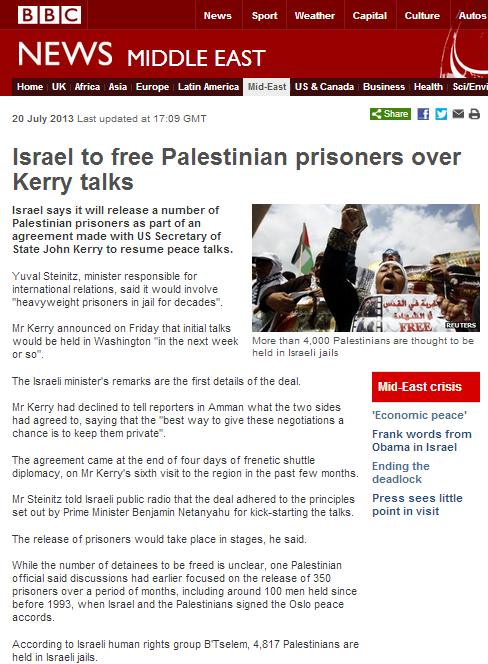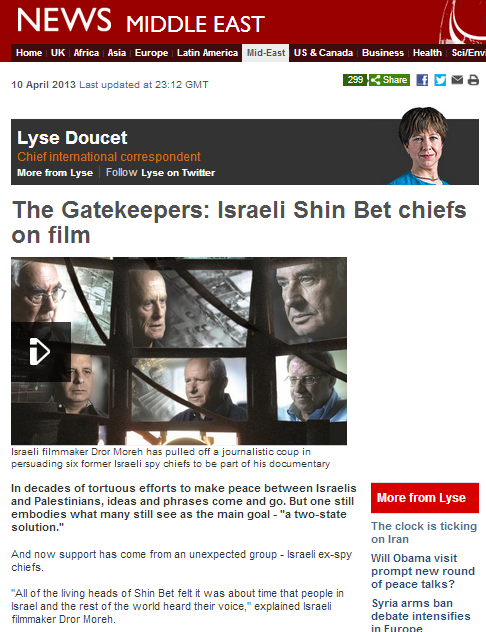Visitors to the BBC News website last weekend found no shortage of reading matter concerning the US president’s decision not to recertify (under the terms of the Iran Nuclear Agreement Review Act – INARA) the JCPOA.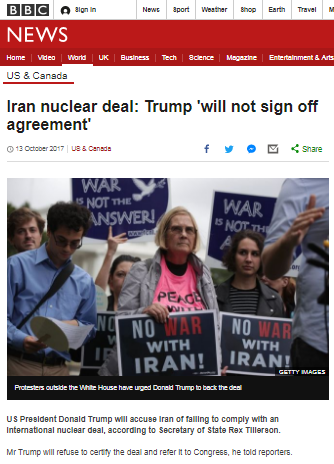
“What will Trump do about the Iran nuclear deal?” Jonathan Marcus 12/10/17
“Iran nuclear deal: Trump ‘will not sign off agreement’” 13/10/17
“Trump’s ‘new’ Iran policy and the difficulties ahead” Jonathan Marcus 13/10/17
“Trump aims blow at Iran and threatens landmark nuclear deal” 13/10/17
“Trump hands Iran chalice to Congress” Anthony Zurcher 13/10/17
“Europe backs Iran deal, Saudis hail Trump’s move” 13/10/17
“Iran nuclear deal: Global powers stand by pact despite Trump threat” 14/10/17
Some of those BBC articles include statements concerning Iran’s Revolutionary Guard Corps – IRGC.
“The activities of Iran’s Revolutionary Guard Corps and its missile-research effort have continued. […]
One suggestion is that the Trump administration might decide to brand the whole of Iran’s Revolutionary Guard Corps as a terrorist entity.
This body – part security force, part military, part ideological vanguard – also controls a significant part of the Iranian economy.” [source]
“It is thought he [Trump] will also focus on its non-nuclear activities, particularly those of the Revolutionary Guards (RIG), which has been accused of supporting terrorism. […]
Who are the Revolutionary Guards?
Set up shortly after the 1979 Iranian revolution to defend the country’s Islamic system, they provide a counterweight to the regular armed forces.
They are a major military, political and economic force in Iran, with some 125,000 active members, and oversee strategic weapons.
They have been accused of supporting Shia Muslim militants in Lebanon, Yemen, Iraq and Syria.” [emphasis added] [source]
“He [Trump] also called for new sanctions on Iran’s elite Revolutionary Guards, which he called the “corrupt personal terror force of Iran’s leader”, and restrictions on Iran’s ballistic missile programme, which is not covered by the deal.” [source]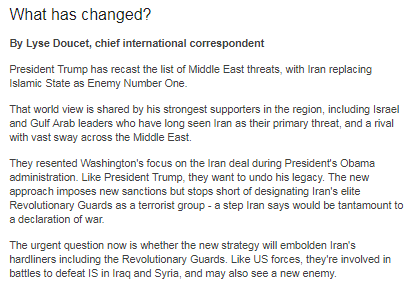
Two of the reports (see here and here) include an insert of analysis by the BBC’s chief international correspondent Lyse Doucet in which readers are told that:
“The new approach imposes new sanctions but stops short of designating Iran’s elite Revolutionary Guards as a terrorist group – a step Iran says would be tantamount to a declaration of war.” [emphasis added]
But is that an accurate portrayal?
On October 13th the US Treasury Department issued a statement headlined “Treasury Designates the IRGC under Terrorism Authority and Targets IRGC and Military Supporters under Counter-Proliferation Authority”.
“Today, the U.S. Department of the Treasury’s Office of Foreign Assets Control (OFAC) designated Iran’s Islamic Revolutionary Guard Corps (IRGC) pursuant to the global terrorism Executive Order (E.O.) 13224 and consistent with the Countering America’s Adversaries Through Sanctions Act.”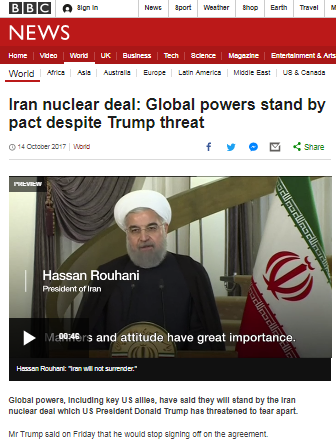
Executive Order 13224 was created in 2001 and it is one of two ways by which groups or individuals can be designated under US law.
“There are two main authorities for terrorism designations of groups and individuals. Groups can be designated as Foreign Terrorist Organizations under the Immigration and Nationality Act. Under Executive Order 13224 a wider range of entities, including terrorist groups, individuals acting as part of a terrorist organization, and other entities such as financiers and front companies, can be designated as Specially Designated Global Terrorists (SDGTs).”
The Countering America’s Adversaries Through Sanctions Act (CAATSA) came into effect in August 2017 and inter alia it:
“…directs the President to impose sanctions against: (1) Iran’s ballistic missile or weapons of mass destruction programs, (2) the sale or transfer to Iran of military equipment or the provision of related technical or financial assistance, and (3) Iran’s Islamic Revolutionary Guard Corps and affiliated foreign persons.”
The US Treasury clarified that while the IRGC has not been designated as a Foreign Terrorist Organisation under the Immigration and Nationality Act, it had been designated under the second possible route.
“Consistent with that requirement of CAATSA, OFAC designated the IRGC on October 13, 2017, pursuant to E.O. 13244 for providing support to the IRGC-Qods Force, which previously had been designated for its support to various terrorist groups.”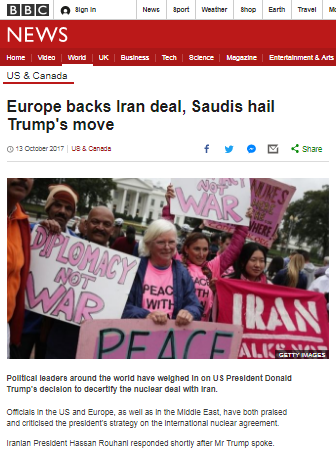
At the FDD, Amir Toumaj explains:
“President Donald Trump has levied a terrorism designation against Iran’s Islamic Revolutionary Guard Corps (IRGC) in its entirety pursuant to Executive Order (E.O.) 13224. […]
A decade ago, the US sanctioned the IRGC’s exterritorial branch, the Qods Force, for terrorism pursuant to E.O. 13224 for its role in providing material support to terrorist groups such as the Taliban and Iraqi-Shiite militias. […]
Per the Countering America’s Adversaries Through Sanctions Act (CAATSA), which passed in August, the US president was to by Oct. 30 designate the IRGC as a whole pursuant to E.O. 13224, or justify to Congress why a waiver is in America’s vital national security interest.”
Lyse Doucet’s claim that the US administration “stops short of designating Iran’s elite Revolutionary Guards as a terrorist group” is hence inaccurate and materially misleading.


